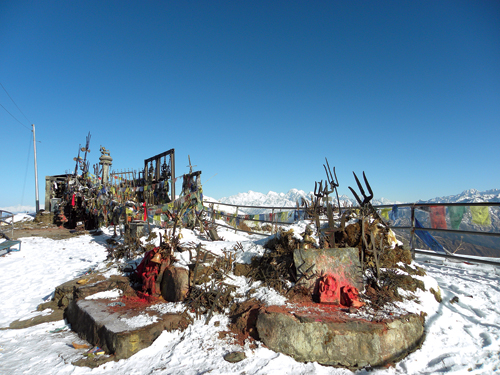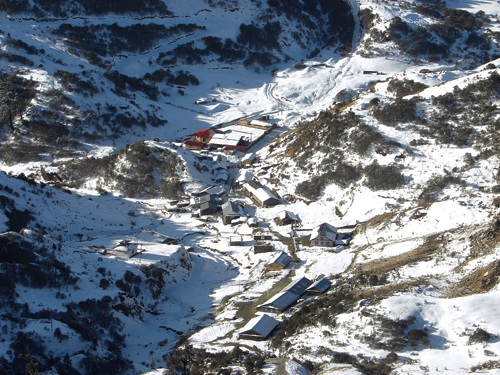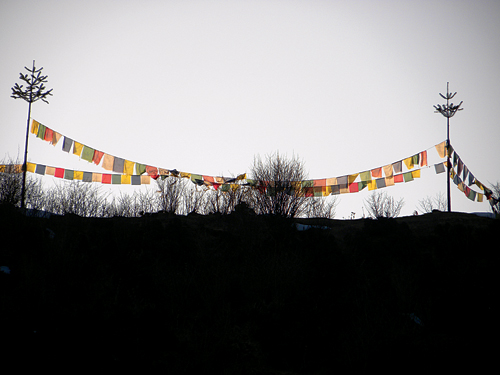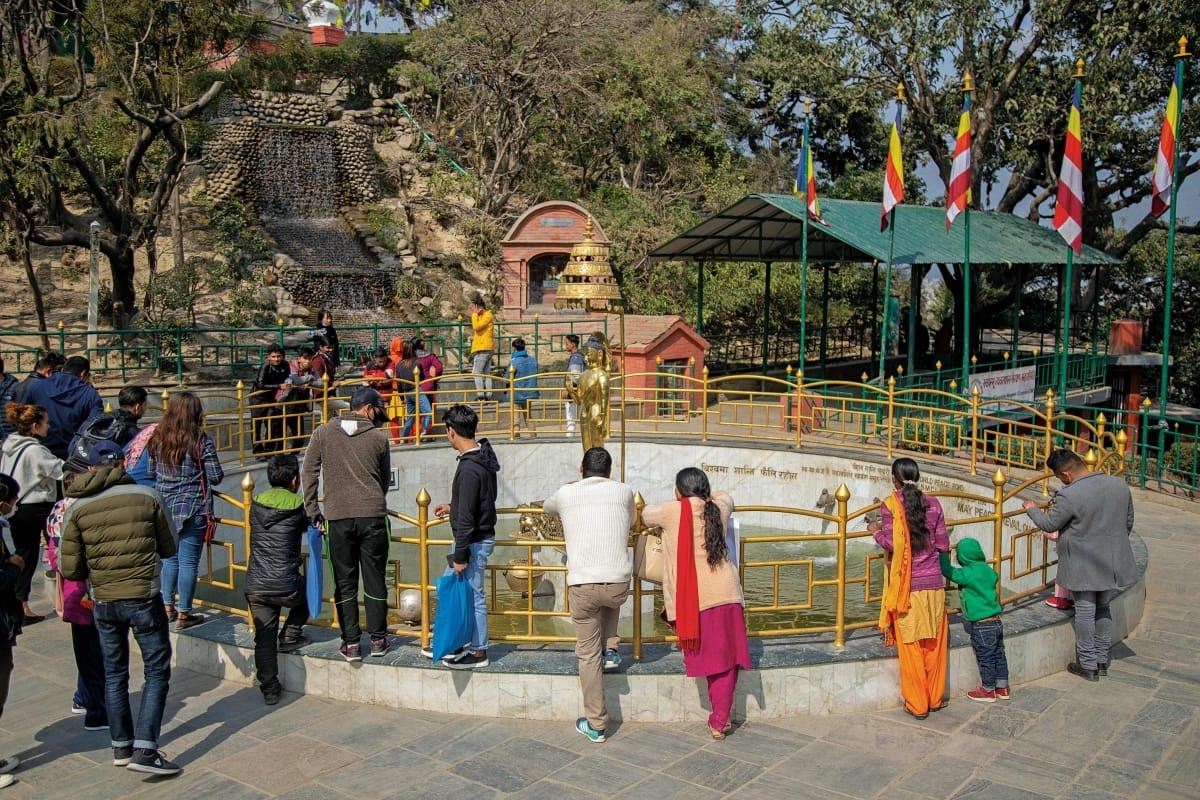Kuri village in Dolakha District is a classic example of what electricity and roads can do for – and do to – a village
A thin plume of smoke rose up from a heap of sawdust beside the door of an old teahouse. I caught a mixed smell of burning wood and freshly sawed wood. Across the graveled street, a new wooden house, a lodge, was being built. The sawdust burning near the door on which my companion and I stood inquiring about prices was from this lodge in the making. Next time I come to this tiny village called Kuri, I thought, I would have another hotel to choose from. The next time, I didn’t have to be told, the tiny village would be more like a town of lodges.

During my last visit, over a year ago, I had witnessed unprecedented growth and change. Now, it was uncontrolled. What had been a small village in a small valley was now a constantly growing collection of lodges, one newer than the other, the newest always a little bigger than the last. The sights and sounds of Kuri were of imminent growth and expansion: piles of saw dust and wood shavings, dazzlingly bright rooms and spotlessly clean lodges. Even as owners of lodges showed you their rooms, the shrill voice of an electric saw proclaimed a new lodge coming to life. To me, a selfish visitor and aficionado of quaintness, it was unbearable.

Electricity Gives, Electricity Takes
Electricity had come to Kuri a couple of years ago, and it seemed the place was not buying it but trading it for their old lifestyle; electricity came in one way, the old lifestyle drained out the other. Every hotel we walked into to inquire about the prices had the owner, along with a small crowd, glued to TV sets in a trance. We finally decided on a newly-opened hotel. ‘Om Mani Padme Hum’ was playing in the kitchen. The hotel was lit up. Back in Kathmandu, there were daily power cuts of several hours. This village with round the clock electricity was using electricity round the clock, or so it seemed, to escape being a village. The village consumed electricity and electricity in turn consumed it: the sound of bells around the yaks’ necks was drowned by the sound of the thumping music from CD players or the omnipresent drill or saw.
As I sat in the room waiting for dinner, my mind went back to the first time I had come here. This kitchen that I was sitting in was big, bright and comfortable—as different as it could be from the one I had waited in three years ago. There was something pleasantly archaic about that kitchen. There was the feel of a home to it. This lodge with all its relative opulence was built for comfort. I felt the difference intensely because there were too many facilities now.
When I had first seen Kuri, it had failed to live up to my expectation of size. I had written: ‘Kuri was hardly the thriving village I had pictured it to be. It was a few houses huddled together into a settlement, in a little valley. Through the middle was a stony pathway. A black, gaunt hill stood in the background, atop which rested the shrine of the Kalinchowk deity, more challenging than welcoming; a physical test of one’s spiritual devotion’. In a peculiar turn of events, Kuri had become what I had once imagined it to be. Now, it was a thriving village. Only the black hill remained as it had been.
The highlight of that trip had been my mistaken identity as a thief. Two women had seen me amble down a hill onto the trail a little ahead of them and mistaken me for a thief. Kuri was so small back then that the “thief” and the “victims” had slept under the same roof in the evening—the only teahouse open to rent rooms on that day. Now no one mistook me for anything other than a trekker. Even my landlady from that night of comedy of errors failed to recognize me. She was a bit apologetic about it. “So many people come,” she drawled, conveying as much sadness as fact. What she might have very well been saying was that why bring up old stories? Why hold on to the old Kuri? The thing to embrace now was change, and I was clinging to the past.

Food from the Forest
Change is something I feel and try to make sense of most whenever I am in Kuri. Sure there were now enough rooms in the village so that no one, like a friend of mine, would have to sleep in the village monastery. But the availability of places to stay left no room for memorable experiences, like sleeping in a village monastery. I slowly realized that what I missed most, what made Kuri so bland, even shallow was the lack of serendipity. Everything working out to plan left no chance for the unplanned and unexpected.
On my second day in Kuri I asked Sonam, the man running the teahouse, if my companion and I could accompany him on his daily trip to the forest. It was one activity that had ties to the old rural lifestyle. We had seen him bring back mushrooms the day before. I also thought it was a chance to see some wild animals. The forests around Kuri, I knew from some wildlife experts as well as locals, were home to bears and musk deer. Although rapidly thinning, the forests were an important staging ground for birds and mammals that descended from higher altitudes during the cold months. A large area east of Kalinchowk was now the Gauri Shankar Conservation Area, named after the twin mountains that in turn took their name from the Hindu God Shiva and his wife Gauri. Just like the goal of the Gauri Shankar Conservation Area was protection of wilderness, the aim of Kuri was to become a tourist attraction. The rate of transforming trees from the forest into lodges in the village was phenomenal.
Sonam turned out to be a wonderful guide. We collected a lot of mushrooms, photographed those we couldn’t eat, and ate a variety of berries. “You’re a good husband,” my companion had said to him as she saw him make trips to the forest to add something to the menu. On our walks in other villages she had seen women carrying huge piles of grass minutes after passing indolent men playing cards. “What’s wrong with the men in Nepal? she would gasp. Not having an exact answer, I would extol the fortitude of Nepali women. Sonam had come across as an exception, a diligent worker and solicitous husband, and saved our faces to a certain extent.
Search for an Ascetic’s Cave
But I doubted Sonam’s knowledge of Kuri’s history with regard to one thing. Kuri was one of the several places in Nepal where the Khaptad Baba, a revered ascetic, had stayed for a few years before continuing his travels. I had heard stories that he had meditated in a cave here. I calculated that this must have been well over seventy years ago. (What would he say if he saw Kuri today?) Sonam took us to the “cave.” It was a hole in the ground, some twenty feet deep. Getting in, let alone staying there for any period of time seemed impossible. Sonam explained that the cave must have changed significantly since the ascetic had meditated in it. I wasn’t convinced.
Meditation, it seemed, was the only way to find that old Kuri, for it was now an image that only existed in the mind. My companion and I walked up to the Kalinchowk Bhagwati’s shrine. Half way up the trail to the shrine, Kuri was engulfed by the mist. A downpour arrived at the same time as us at the shrine. The shrine was as I remembered it: rusting tridents, a cluster of bells, and the small hole smeared in red, which symbolized the deity. The shrine was cold and silent and away from that keening of the electric saw. It was the one place that hadn’t changed.
The small valley that cradled Kuri was visible from the high perch of the shrine. Across the valley to the south was the hill where the shrine had once been. It had been moved to this higher location after cattle belonging to the herders became a nuisance, eating the offerings left by devotees in the shrine, thereby polluting the shrine. Kuri was expanding in all directions. The length of the valley was now rapidly proving too short.
Certainly the new Kuri had some pleasant changes. The hotel I was staying in had an attached bathroom—a boon in a place where the temperatures fall below zero in the winter. The first time I came to Kuri and had asked for the bathroom, I was shown out into the open, under a sky studded with stars. Suddenly, an electric saw began whining somewhere and the light in the bathroom flickered—another hotel, another blow, I felt, to the beauty of Kuri.
Kuri’s transformation (deterioration to me) was visible from the ground level, too. The very entrance to the village was now marked, counting out the temporary herder’s camp, by a gargantuan lodge. Its main sitting area had an enormous hearth in the center and enough room to seat over fifty people at a time. It had a wall over eight feet high. I was bewildered by its size and could not comprehend the logic behind the enormous wall. I knew that I was unknowingly turning a blind eye to the present and perhaps the future of Kuri. At either end of the length of Kuri, but segregated from the main settlement, were temporary herders’ huts. Transhumance, the traditional lifestyle, was now being pushed further and further away to accommodate the new livelihood: tourism.
The hotel that I had stayed in during that trip a few years ago now not only had two new stories of rooms but a kitchen that could only seat half a dozen people at a time. The loss of the old Kuri with soot-stained kitchens and cardboard wall rooms was not as plangent to me as the loss of that unique experience of crowding in a big room that was kitchen, dining room and bedroom all in one. That was hard to replicate.
The major agent (culprit to me) was the road to Kuri. It now had buses that carried people all the way to their villages or a little further from Kuri. Unlike in the days when there was no road, no one needed to stay in Kuri because the next village was too far away. Staying nights in Kuri had become an option that few took.
In the end, it was all about timing, I thought. The first time, I had caught Kuri at a moment of simplicity and magic. It was a folly on my part to expect Kuri to preserve that quality, to stand still and resist change. After all, for the locals the moment of magic must as easily have been the arrival of the first vehicle to their doorsteps. Even though Kuri was rapidly turning into something I didn’t like, I hoped I would find that moment again someday. The old Kuri wasn’t irretrievable after all. Someday when I am there all but one hotel may be open, a bus may break down near Kuri and the lines carrying electricity might snap and throw the village back in time.








